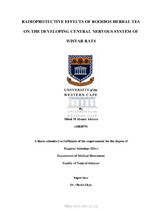Radioprotective effects of rooibos herbal tea on the developing central nervous system of wistar rats
Abstract
Background: Early postnatal radiation exposure from environmental, diagnostic or therapeutic
sources is potentially deleterious to the developing nervous system resulting in oxidative stress,
structural damage, altered neurochemistry, DNA damage, inflammatory stresses as well as
correlating cognitive impairment during adult life. Numerous studies in literature have
investigated the radioprotective effects of medicinal plants and beverages. However, only a few
studies have focused on the radioprotective effects of rooibos, an indigenous South African
herbal tea, well known for its many acclaimed health benefits.
Aims: This study was done to investigate the diverse radioprotective potential of fermented
Rooibos herbal tea (FRHT) consumed ad libitum by pregnant rats on the adult offspring rats
exposed to a once-off 6 Gy dose of gamma irradiation on postnatal day 3.
Methods: Twenty-four (24) adult female rats were equally divided into four groups (6 per
group) as control (NS), radiation (X), tea (RT) and their combination. On PND 30, offspring rats
were subjected to neurobehavioural assessment for open field and novel object recognition
parameters and later sacrificed, the brain tissues removed and processed for histological,
immunohistochemical and neurochemical analyses, using standard techniques.
Results: Pre-treatment with FRHT showed overall protection against radiation-induced
distortions in offspring rats by significantly improving exploratory activity, the frequency of
central square entry, rearing episodes, cumulative freezing time and memory retention as
indicated by a relatively higher recognition index. FRHT was also found to significantly improve
the antioxidant defence mechanisms in the offspring rats by reversing lowered FRAP levels,
increasing superoxide dismutase and catalase enzyme activities and reducing lipid peroxidation.
Histological and immunohistochemical analyses showed that morphological alterations were
generally attenuated in the RTX group and the high number of caspase-3 and Glial fibrillary
acidic protein (GFAP)-positive cells was significantly reduced, indicating protective effects
against apoptosis and gliosis.
Conclusion: Taken together, our findings tend to suggest that the potential radioprotective
effects of FRHT are multimodal, possibly executed through the anti-apoptotic, antioxidative,
anti-gliosis and other mechanisms, as observed in this study, and this is often attributed to the
high polyphenol content in Rooibos tea.

